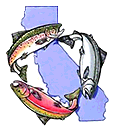Presenter Abstracts are due on November 9, 2015
Session Coordinator Abstracts with a list of final presenters are due on November 13, 2015
Field Tours
- Voyage of the Argonauts: Returning Habitat, Economic Prosperity and Navigability to the Eel River Delta
- Lower Mattole River and Estuary: Heliwood Placement, Riparian Planting, & Off-channel Slough Restoration
- Lower Klamath and Strawberry Creek, National Park Service Restoration Projects
- Headwaters Forest Reserve Upland Restoration to Tidewaters of Salmon Creek
- Headwaters to Bay: Tour of Arcata’s Community-based Urban/Wildland Restoration Program
- Fish Passage and Tidegates Restoration in Humboldt Bay and the Mad River Watershed
Workshops
- A Dam Fine Workshop: Evolving Science of and Policy to Restore Streams Using Instream Obstructions and Beaver Dam Analogs
- Design and Engineering of Off-Channel Habitat and Large Wood Projects
- Instream Flow Enhancement and Groundwater Recharge Planning
- Let’s Get Connected – Tools for Getting Meaningful Public Input and Participation
Concurrent Sessions
- Upper Klamath-Trinity River Spring-Run Chinook: Biology, Genetics and Recovery
- Life-cycle Modeling to Inform Conservation, Restoration, and Recovery Planning
- Gold Country — Legacy Impacts and Restoration Strategies
- Incised Stream Channels: Causes and Environmental Impacts, and Practical Restoration Solutions
- Salmonid Physiology, Diseases and Fish Health
- The Impacts of Cannabis Cultivation on Fisheries Recovery
- Eel River Biology: Salmonids, Sturgeon, Lamprey, and Multi-species Planning
- Shelter in the Slow Lane: Off Channel Ponds and Beaver Influenced Habitats
- Climate Change: Effective Restoration for a Warming World
Each concurrent session includes six speakers. Speaker presentations are 25 minutes including questions. SRF encourages presentations on completed projects that have a monitoring and assessment component. The Agenda Coordinator will work with each Session Coordinator (SC) towards confirming presenters by November 7 and finalizing speaker abstracts.
Submitting Session and Presentation Abstracts
The SRF Call for Abstracts has become very competitive and presentations that have not previously been made at the SRF Conference will be given priority. Refer to the workshop descriptions or session descriptions to ensure that your abstract submission aligns with the proposed focus.
Please e-mail your abstract in a Word Document to abstracts@calsalmon.org.
Word Document Format:
- 12 point, Times New Roman font, and left justified only
- Title of your abstract
- A list of all the authors, their affiliation, and e-mail address. Presenters must be clearly identified. Please write out this information exactly as you would want it listed in the Presenter Directory. Please note that co-authors will not be listed in the conference agenda packet but they will be acknowledged in the Proceedings.
- Indicate if the presenter is a student.
- An indication of what concurrent session or workshop you would like to contribute to, or indicate “Poster.” Include preference of presentation type (ie- Powerpoint LCD projector).
- An abstract of 500 words of less.
Example
Title: Sample Title
Author: John Smith, PhD, California Department of Fish and Wildlife, john.smith@wildlife.ca.gov (Presenter), and Co-author: Martin Jones, PE, NOAA Fisheries, martin.jones@noaa.gov
Concurrent Session: Upper Klamath-Trinity River Spring-Run Chinook: Biology, Genetics and Recovery
Abstract: Write your abstract here.
All contributions, including Session and Presentation Abstracts, should be submitted electronically by email to abstracts@calsalmon.org with abstract attached as an MS Word file. Receipt of your submission will be acknowledged by email and forwarded to the correct session chair. If your abstract is not placed, please consider presenting in the poster session, which is open to all conference participants. For any additional information, please contact SRF at (707) 923-7501 or at info@calsalmon.org.
